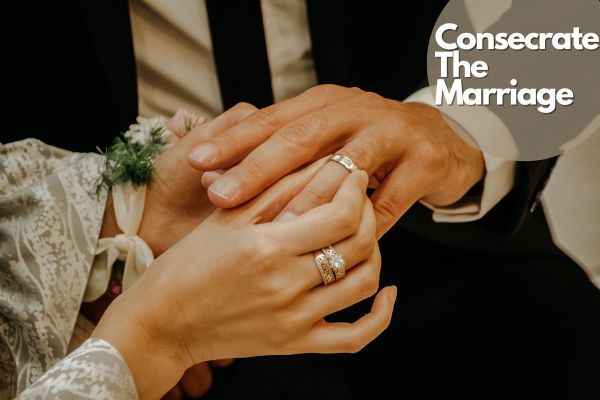Looking to elevate your marital bond to a higher level of spiritual and emotional connection? Discover the transformative power of consecrating your marriage. In this article, the topic “consecrate the marriage”, we explore the meaning, rituals, and significance of marriage consecration, shedding light on its historical, cultural, and religious aspects.
We also provide valuable insights on preparing for this sacred commitment and sustaining a consecrated marriage. Join us as we delve into the beauty of consecrating your marriage and unlocking a lifetime of love, growth, and fulfillment.
Consecrate The Marriage (Definition)
Marriage consecration refers to the act of formally dedicating or sanctifying a marriage, imbuing it with a higher level of significance, sacredness, and spiritual or religious meaning. It involves acknowledging and honoring the commitment between two individuals, elevating their union beyond a legal or social contract.
Marriage consecration often involves rituals, ceremonies, or religious practices that symbolize the couple’s commitment, unity, and devotion to each other and their shared values. It is a way to invite blessings, divine guidance, and spiritual support into the marital relationship, reinforcing the intention of lifelong love, growth, and fulfillment.
Purpose Of Marriage Consecration
The purpose of marriage consecration is multi-faceted and can vary depending on religious, cultural, and personal beliefs. However, some common purposes of marriage consecration include:
1. Deepening The Spiritual Connection
Marriage consecration allows couples to deepen their spiritual connection with each other and with a higher power or divine presence. It acknowledges the sacred nature of the marital bond and invites spiritual blessings, guidance, and support into the relationship.
2. Strengthening Commitment
Consecrating a marriage reinforces the commitment between partners, emphasizing that their union is not merely a legal or social contract, but a lifelong commitment rooted in love, trust, and shared values. It serves as a reminder of the sacredness and importance of honoring and nurturing their relationship.
3. Establishing A Solid Foundation
Marriage consecration provides an opportunity for couples to reflect on their individual beliefs, values, and expectations, and align them with their shared vision for their marriage. It encourages open communication, mutual understanding, and the establishment of a solid foundation built on love, respect, and shared goals.
4. Creating Meaningful Rituals
Through marriage consecration, couples can create and participate in meaningful rituals and ceremonies that symbolize their love, unity, and lifelong commitment. These rituals can serve as powerful reminders of their bond and can be passed down through generations, strengthening family ties and traditions.
5. Seeking Support And Guidance
Marriage consecration often involves seeking guidance and support from religious or spiritual leaders, mentors, or experienced couples. This support can provide wisdom, advice, and tools for navigating the challenges and joys of married life, fostering personal and relational growth.
6. Celebrating And Renewing The Marriage
Consecrating a marriage offers opportunities for celebration, not only during the initial ceremony but also through the renewal of vows, anniversaries, and other significant milestones. These moments allow couples to reaffirm their commitment, express gratitude for their journey together, and celebrate the growth and love they have nurtured.
Overall, the purpose of marriage consecration is to infuse the marital relationship with spirituality, meaning, and a sense of divine connection, fostering a deeper bond and creating a solid foundation for a lifelong journey of love, growth, and fulfillment.
The Religious And Spiritual Significance Of Consecrating A Marriage
The religious and spiritual significance of consecrating a marriage varies across different faith traditions and beliefs. Here are some general aspects of religious and spiritual significance associated with marriage consecration:
1. Divine Blessings
Consecrating a marriage is often seen as an opportunity to invite and seek the blessings of a higher power or deity. It is believed that through this sacred act, the couple receives divine favor, protection, and guidance for their marital journey.
2. Sacred Covenant
Many religious traditions view marriage as a sacred covenant between the couple and their faith community or divine authority. By consecrating their marriage, couples make a solemn commitment before God or their spiritual community, vowing to uphold the principles and values of their faith within their union.
3. Spiritual Unity
Marriage consecration symbolizes the spiritual unity and oneness of the couple. It is seen as a joining of souls, a bond that transcends the physical and emotional aspects of the relationship. The ceremony acknowledges the spiritual connection between the partners and their shared spiritual journey.
4. Sacramental Significance
In certain religious traditions, marriage is considered a sacrament—an outward sign of inward grace. Consecrating a marriage elevates it to a sacred act that bestows spiritual blessings, grace, and sanctification on the couple, enabling them to live out their commitment in accordance with their religious teachings.
5. Rituals And Symbolism
Marriage consecration often involves rituals, symbols, and sacred objects that hold deep spiritual meaning. These elements, such as exchanging vows, wearing ceremonial attire, exchanging rings, or participating in religious rites, serve to sanctify and consecrate the marriage in the eyes of the divine and the faith community.
6. Spiritual Growth And Transformation
Consecrating a marriage is seen as an opportunity for spiritual growth and transformation. It calls upon the couple to embody virtues such as love, compassion, forgiveness, and selflessness, helping them develop spiritually and deepen their connection to their faith and higher purpose.
7. Community Support
Marriage consecration is often witnessed and celebrated by the religious or spiritual community. The presence of family, friends, and fellow believers reinforces the spiritual significance of the union and provides a supportive network for the couple throughout their married life.
Rituals And Ceremonies Of Marriage Consecration
Rituals and ceremonies associated with marriage consecration can vary widely depending on cultural, religious, and personal preferences. Here are some examples of common rituals and ceremonies that are often part of the marriage consecration process:
1. Exchange Of Vows
The exchange of vows is a central ritual in many marriage consecration ceremonies. The couple declares their love, commitment, and promises to each other in the presence of witnesses, often using personalized or traditional vows.
2. Ring Exchange
The exchange of wedding rings symbolizes the eternal bond and commitment between the couple. Rings are often blessed or consecrated before being exchanged, representing the unending circle of love and unity.
3. Blessings And Prayers
Religious or spiritual leaders may offer blessings, prayers, or invocations during the ceremony to invoke divine guidance, protection, and blessings upon the couple. These blessings may be specific to the couple’s faith tradition or personalized based on their beliefs.
4. Unity Rituals
Unity rituals are symbolic acts that represent the joining of two individuals into a unified partnership. Examples include the lighting of a unity candle, pouring sand into a shared vessel, or tying the ceremonial knot. These rituals symbolize the merging of lives, families, and destinies.
5. Reading Of Sacred Texts Or Poems
Passages from religious texts, sacred scriptures, or meaningful poems may be read during the ceremony to reflect the couple’s beliefs, values, and aspirations. These readings can provide guidance, inspiration, and wisdom for their marital journey.
6. Ritual Washing Or Cleansing
Some traditions incorporate ritual washing or cleansing as a symbol of purification and spiritual preparation. This practice may involve the couple washing their hands, feet, or receiving a ceremonial bath as a way to begin their married life with a sense of spiritual purity.
7. Cultural Traditions
Many marriage consecration ceremonies incorporate cultural traditions and customs that hold significance for the couple and their families. These may include traditional attire, dances, music, or rituals specific to their cultural heritage.
8. Community Involvement
Marriage consecration ceremonies often involve the participation of family, friends, and the broader community. They may play roles as witnesses, supporters, or active participants in certain rituals, reinforcing the communal and social aspects of the union.
It’s important to note that the specific rituals and ceremonies of marriage consecration can vary widely based on individual preferences, cultural practices, and religious traditions. Couples are encouraged to consult with religious or spiritual leaders and customize their ceremony to reflect their beliefs, values, and traditions that resonate with them.
Sustaining A Consecrated Marriage
Sustaining a consecrated marriage requires ongoing effort, commitment, and a willingness to nurture the relationship. Here are some key aspects to consider when it comes to sustaining a consecrated marriage:
1. Cultivate Emotional Intimacy
Emotional intimacy forms the foundation of a strong and lasting marriage. Foster open and honest communication, active listening, and empathy towards each other’s thoughts, feelings, and experiences. Create a safe space where both partners can share their vulnerabilities and support each other emotionally.
2. Practice Mutual Respect
Respect is crucial in any relationship. Treat each other with kindness, consideration, and appreciation. Honor each other’s individuality, opinions, and boundaries. Show respect not only in words but also through actions that demonstrate your love, support, and admiration for one another.
3. Commit To Continuous Growth
Personal growth is an essential part of sustaining a consecrated marriage. Strive for self-improvement and encourage each other’s growth. Embrace new experiences, acquire new skills, and pursue individual passions. Together, set goals for personal and joint growth, and support each other’s aspirations.
4. Prioritize Quality Time
Make intentional efforts to spend quality time together. Set aside dedicated time for shared activities, conversations, and meaningful connections. Create rituals or traditions that strengthen your bond, such as regular date nights, shared hobbies, or annual getaways.
5. Practice Forgiveness And Letting Go
Forgiveness is a powerful tool for healing and sustaining a consecrated marriage. Learn to forgive each other for mistakes, misunderstandings, and conflicts. Holding onto grudges or resentment can create distance and hinder growth. Practice forgiveness and work towards resolving conflicts in a healthy and constructive manner.
6. Nurture Physical Intimacy
Physical intimacy plays an important role in sustaining a loving and fulfilling marriage. Maintain a healthy and affectionate physical connection through acts of intimacy, touch, and sexual expression. Communicate openly about your needs, desires, and boundaries in this area, ensuring mutual comfort and satisfaction.
7. Keep The Friendship Alive
A strong friendship is the backbone of a successful marriage. Cultivate a deep sense of friendship by enjoying each other’s company, sharing laughter, and supporting each other through both joyous and challenging times. Be each other’s confidant, cheerleader, and source of strength.
8. Seek Support When Needed
Don’t hesitate to seek support when faced with difficulties or challenges. Reach out to trusted friends, family members, mentors, or professional counselors for guidance and assistance. Additionally, consider involving your religious or spiritual community for spiritual guidance and support during challenging periods.
Conclusion
As you embark on your marital journey, remember the profound impact of consecrating your marriage. By establishing a strong foundation, seeking guidance, and embracing meaningful rituals, you can infuse your relationship with love, spirituality, and purpose.
Sustaining a consecrated marriage requires ongoing nurturing, honoring shared values, and periodically renewing your commitment. Embrace the transformative power of consecration, celebrating your love and creating a lasting bond that will endure the tests of time. Start this extraordinary journey today and witness the magic of a truly consecrated marriage.





![How Often Do Married Couples Have Intercourse? [Answered] 4 How Often Do Married Couples Have Intercourse](https://www.marriagehint.com/wp-content/uploads/2023/06/How-Often-Do-Married-Couples-Have-Intercourse-380x220.jpg)


